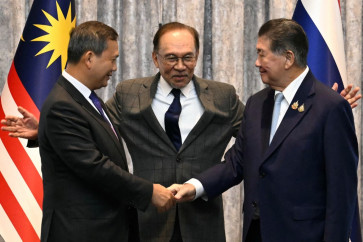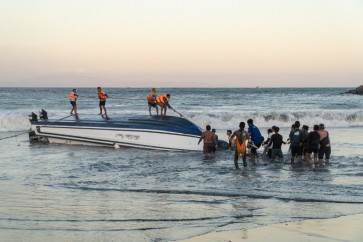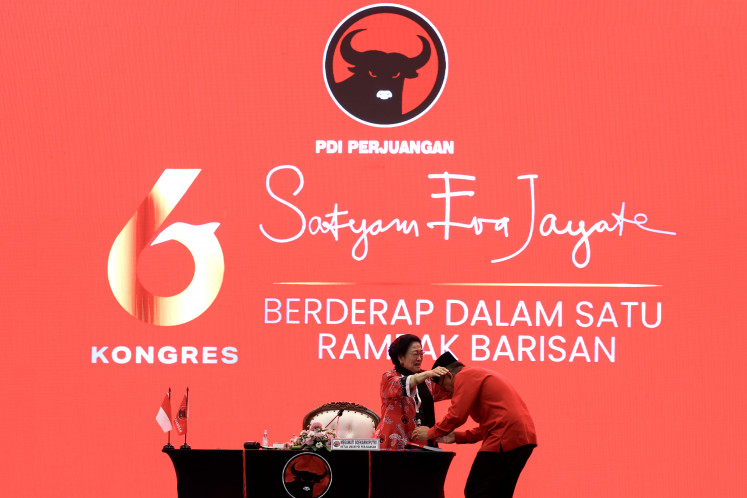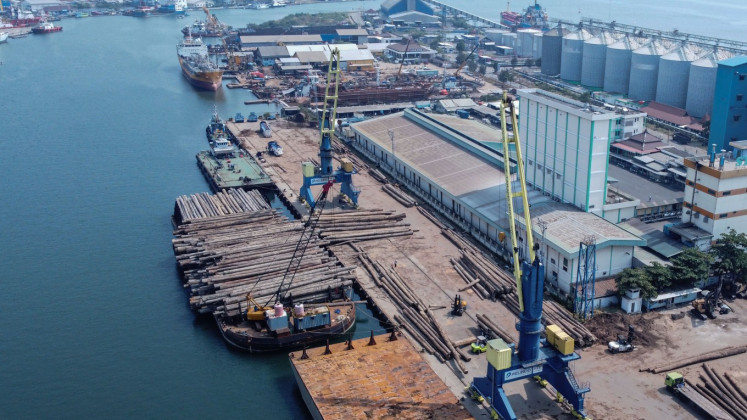Popular Reads
Top Results
Can't find what you're looking for?
View all search resultsPopular Reads
Top Results
Can't find what you're looking for?
View all search resultsThe dying WTO and future of global trade
The 10-year-old Doha Round of the World Trade Organization (WTO) is dying
Change text size
Gift Premium Articles
to Anyone
T
he 10-year-old Doha Round of the World Trade Organization (WTO) is dying. The round, named after the city in Qatar where negotiations were started in November 2001, was planned to be a development agenda whereby global trade could create jobs and eradicate poverty — especially in poor and developing countries.
Nonetheless, there are so many unbridgeable gaps in the negotiations right now. The trade talks themselves have been intensified since January at the WTO office in Geneva, but this has only resulted in frustration from its members.
This could suggest that the era of big, multilateral trade deals is over. All 153 members have experienced the black and blue of creating a global trade master plan in almost a decade. At last, we realize that it is almost impossible to create the master recipe.
In the future, trade deals will either not involve every WTO member, a so-called plurilateral deal, or will be limited in scope. A glimpse of “hope” from the dying Doha Round is a Doha-lite, a Plan B, which is far less ambitious than what is now at the table: a maneuver to save faces. WTO director-general Pascal Lamy calls it an “early harvest” program.
There is long history of imbalance in the WTO, and it is getting more difficult for the institution to move ahead on its current trajectory because many poor and developing countries are being left behind. In order to survive, there is a need for revolutionary acts to address the imbalance.
Developing countries actually have been pushing for this since the 3rd Ministerial Meeting in Cancún, Mexico in 2003. The stratagem mastered by India and Brazil successfully replaced Japan and Canada as the power “quad” in the WTO. This continues until the era of agriculture: Many countries whose economies are agriculture-related have been central in negotiations, such as South Africa, Argentina and Indonesia. However, this is still not sufficient because the core problems of subsidies and market access are still dominated by the United States and European Union.
The WTO now faces the same critics as the other Bretton Woods institutions. The International Monetary Funds and the World Bank have also been blasted for imbalances between countries. These institutions have prompted to overhaul their systems and work on how to empower the poor and developing countries in the near future.
On the other hand, the crisis plaguing the WTO has revealed that the long outcry from the opposition to the idea of free trade — most notably farmer organizations, trade unions and indigenous peoples, since the historical Battle of Seattle in 1999 — has born fruits. In a general sense, the enormous gap has been exposed and shows that the WTO has not really functioned for everyone. Hence a huge amount of pressure has materialized: one extreme outcome could be to kill the WTO, another milder side would be to reform the institution.
Consequently, the question of creating alternatives to the WTO is fully logical. The world needs to really think about this because once again the constellation has really changed.
Nonetheless, creating alternatives might not be that simple. It would neither be enough to state that the United Nations, as one legitimate forum, should be responsible for creating a sui generis institution, nor to believe that existing organizations like the UN Conference on Trade and Development (UNCTAD) can really be up to the task of handling global trade. It would need a great deal of resources to create a new international institution and go beyond what the WTO has done to global trade.
Given the complexity of the former option, one can think that reform is seen as more visible option.
Looking back to both options, there are a couple of points that need to be carefully observed.
First, there are expectations that the constellation can really change and the two options can be implemented if only developed countries, especially the US and EU, are ready for a redistribution of power in the global trade decision-making process. This would lead to many changes in global trade, especially regarding subsidies and market access. This would also mean both the US and EU would expect their economies to slow down. It is easy for us to raise our eyebrows now and ask the perfect question: Would they be willing to do that?
Second, a push is needed from emerging blocs in global trade. There are strong trade negotiation blocs right now, such as the BRIC (Brazil, Russia, India and China) and the G-20. The new net exporters (Argentina, Chile, Uruguay) are also likely to ask for greater market access. These emerging blocs, among others, would shape the future global trade. These are the players that can do much in trade talks.
These changes could lead to benefits for poor and developing countries, as long as the emerging powers are willing to coordinate among themselves.
On top of all these factors, Indonesia as one of the emerging powers in global trade should really think about where multilateral trade agreements in the WTO are headed — and anticipate by taking an active role toward alternatives. Indonesia cannot afford to just be the good kid like we have been so far in WTO talks, especially when we are willing to water down almost all our stances in global trade — stances that are supposed to protect our people and empower our potentials in development.
Dismantling or reforming the WTO will not take place in the blink of an eye. Nevertheless, all recent dynamics should be acknowledged as these would shape the future global trade. The final destination should be global trade justice, trade that respects human rights and is translated into development.
The writer is the head of the international relations department at the Indonesian Farmers Union (SPI). The opinions expressed are his own.










